Breathe Easy with These Carbon Monoxide Safety Tips

Winter is here, which means it’s time to crank up the heat! While heating appliances are operating in your home this season, it’s important to remember a few safety tips about carbon monoxide in order to keep you and your family safe from carbon monoxide poisoning.
Carbon monoxide (CO) is produced from the combustion of carbon-based substances and can be emitted from fireplaces, faulty furnaces, generators, water heaters and other heat sources. Carbon monoxide does not smell and has no taste. Symptoms of carbon monoxide poisoning can cause several flu-like side effects including sickness, nausea, headaches, drowsiness and sometimes even death.
If you believe you have been exposed to carbon monoxide, call 911 and evacuate your home or business.
CO Safety Tips
To keep your household safe this winter, practice these safety tips so you can breathe easy:
- Have a CO alarm and monitor in the home, and test it regularly. Keep the monitor at least 15 feet away from fuel-burning appliances.
- Don’t use grills, generators or camping stoves inside the home. These appliances can emit high amounts of CO, and it’s important to only use them in well-ventilated areas.
- Never leave a car running in the garage. Car exhaust is one of the substances commonly associated with CO poisoning.
- Keep gasoline stored in a locked location away from children, and keep it only in small quantities. It’s also important to keep gasoline away from heat sources to prevent combustion and CO emission.
- Have home heating systems inspected and serviced annually by a trained technician. This includes appliances like furnaces, ovens, gas stoves and and water heaters.
Keep these tips in mind over the coming months so you can keep warm and stay safe as it gets cooler outside.
For more information on natural gas and carbon monoxide safety practices, check out our natural gas safety tips and common mistakes to avoid. For even more info, check out Atlanta Gas Light's Emergency Saftey Information.
 Help
Help Giving Back
Giving Back My Account
My Account Sign Up
Sign Up











